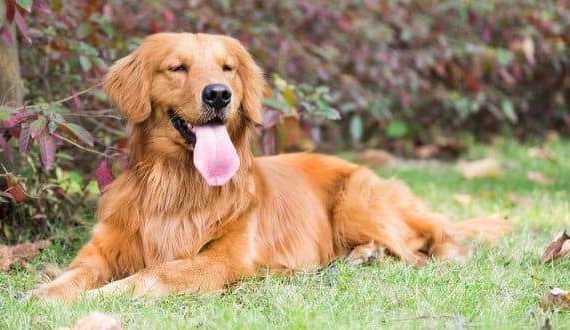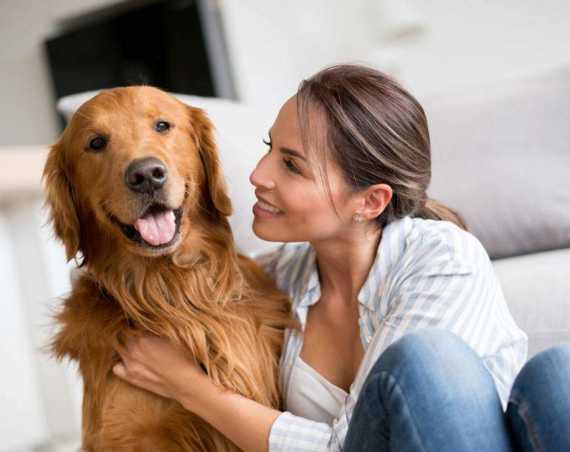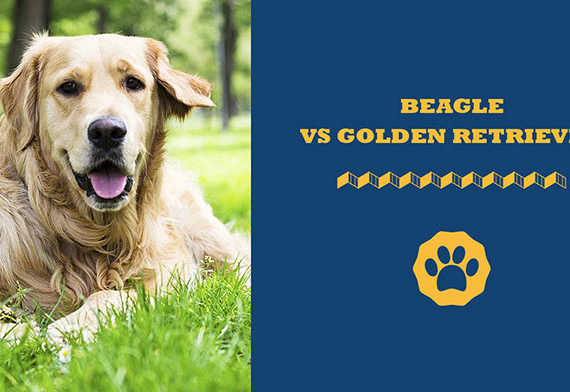Updated: June 1st, 2022
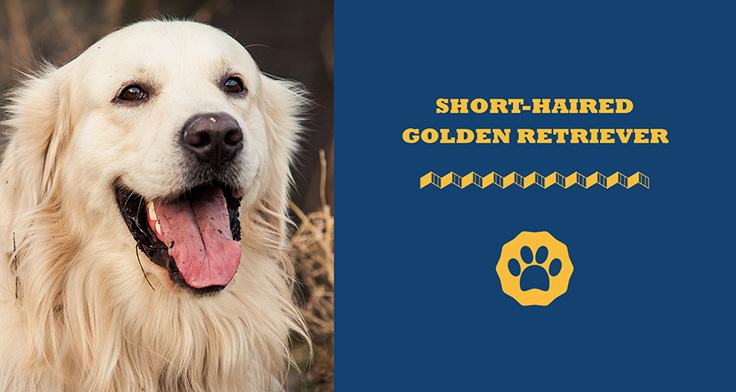
Golden retrievers are magnificent dogs. They are known for their intelligence, loyalty, and of course, their iconic long, wavy hair. Now, you might have heard of a short-haired golden retriever and are probably wondering whether this is a sub-breed or its own separate breed. They are, in fact, golden retrievers–just a unique variation of them.
It is actually fairly easy to confuse a short-haired mixed breed for a golden retriever. Not to worry, though, as this article has all the latest facts on the supposedly short-haired goldies, from their coats and profile to hair length, and frequently asked questions about it.
Golden Retriever Coats
Golden retrievers are unique among dog breeds since they have a double coat. As the name suggests, their coats are made up of two parts. The first part is the undercoat, which is a layer of short, dense hair. This helps keep the dog warm and dry.
But our interest lies in the topcoat, which is made up of medium-to-long hair. On average, it takes three months for the topcoat to appear on a golden retriever puppy. However, it takes more than a year before the topcoat fully grows out. So, how is this different from the short-haired golden retriever and its coat?
What Is A Short-Haired Golden Retriever?
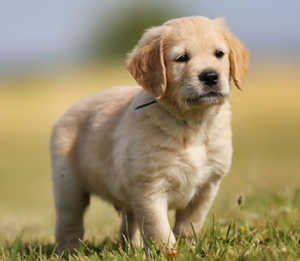
Finally, the part we have been waiting to dissect. Now, even though there’s no sub-breed going by the name short-haired retriever, some types of goldens do actually have shorter hair than others. It all depends on what a particular golden retriever was bred for.
Field golden retrievers, for example, are bred for field work in general, especially hunting, or more specifically, retrieving game. As a result, they are intelligent, obedient, and athletic. They also have shorter topcoats when compared to goldens bred for show.
On the other hand, show retrievers are bred for looks. As a result, they tend to have long, flowy coats. As you can imagine, you won’t find short-haired golden retrievers among retrievers bred for show.
If you’re interested in a short-haired golden of your own, you should be careful, as more often than not, they turn out to merely be mixed breeds.
Don’t get me wrong; mixed breeds are amazing dogs and loyal companions. But given the high price tag of golden retriever puppies, you wouldn’t want to settle for anything less than purebred. If you are in doubt about the ancestry of your retriever, a DNA test at your vet will set matters to rest.
On that note, purebred goldens inherit short coats from their parents. Since hair length is hereditary, tracing the ancestry of your golden is another sure way to find out if your short-haired golden retriever puppy is purebred.
Keep in mind that while the coat of such a retriever is shorter than average, it’s still not as short as the hairs on the coat of mixed breeds like the Golador, for example (a Labrador and golden retriever mix).
Other Types Of Retrievers
It’s not uncommon to confuse other types of retrievers for a golden short-haired dog. Common retriever breeds to watch out for include.
- Curly-Coated Retriever: A curly-coated retriever stands out thanks to its mane of tight, flowing curls. Curly-retrievers are also taller than other retrievers and can have coats ranging from black to silver.
- Flat-Coated Retriever: This breed can be easily identified by its signature long, flat hair. What’s more, retrievers of this breed usually have a black coat as well.
- Chesapeake Bay Retriever: This breed also has a short and wavy coat. Crossing with this breed produces offspring with longer, wavy coats.
Factors That Control Hair Length In Golden Retrievers
Did you know that the long hair on a retriever is a result of a recessive genetic mutation? This mutation occurs in the FGF5 gene, which controls the hair cycle and length on your golden. The topcoat will only grow to lengths that this gene allows.
On the same note, there are additional factors that affect a retriever’s hair length.
Nutrition
Make no mistake–nutrition contributes a lot to the general state of your retriever’s coat. Without the proper nutrients, your retriever won’t be capable of growing a long and lush coat. Make sure to feed your retriever with foods rich in fatty acids such as Omega-3. Such acids strengthen hair follicles, in turn allowing the growth of long, healthy coats.
Age
There’s no need to panic if your golden is yet to grow his hair out. On average, retrievers take about a year and a half to grow fully mature coats. What’s more, males and females grow their coats at different rates.
Starting from the tail, long hair grows gradually over their bodies, moving up to the head. As the topcoat grows, you’ll notice there are areas where hair grows out longer and feathers away from the body. This feathery fur grows primarily on the legs, tail, chest, and stomach. Note that the longer coat grows through the baby fur over a period that can last 18 months.
Health
The state of a retriever’s coat says a lot about its health. In poor health, your retriever’s coat will take a serious hit. The truth is that illnesses negatively affect the quality of your golden’s coat. Not only does the coat lose its healthy sheen, but your retriever might also start shedding its hair at an alarming rate.
To add to this, diseases such as alopecia cause hair loss in dogs. The effects of such a disease might initially convince you that your golden is a short-hair breed. You can avoid this through regular checkups at the vet
Grooming Blunders
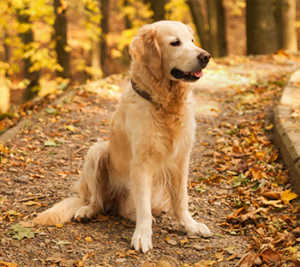
Not knowing how to properly groom your retriever can severely damage its coat. Without an adequate grooming routine, your golden’s coat won’t grow to its full potential.
What many newcomers overlook is regular brushing and de-shedding. With regular brushing, you remove tangles and loose hair, allowing proper hair growth.
De-shedding is done with a special de-shedding tool. Using it, you can safely remove loose hair and mats from lower levels of fur. To add to this, don’t make the mistake of over-bathing your retriever. This leeches essential oils from their hair and skin. The result? A dull long coat lacking luster.
Finally, only use high-quality moisturizing dog shampoo when you do have to wash your retriever. This prevents your retriever’s fur from drying up, especially if you live in an area with a hot, dry climate.
Weather
Yes, the weather does have a huge impact on the state of your retriever’s coat. As you know, hot and dry air dries out the skin and hair follicles. This causes excessive shedding as the dry hair falls out at a faster rate. As you can guess, fewer hairs as a result of the shedding might lead you to believe your golden has a short coat.
There are steps you can take to prevent excessive shedding in hot areas. They include:
- Regular grooming and baths
- Providing lighter meals
- Providing frozen treats
- Bring them indoors
FAQs
Do all golden retrievers have long hair?
The short answer is yes, they do. When compared to other dog breeds, golden retrievers have longer hair. However, it’s worth noting that show goldens have longer hair compared to field retrievers. Remember, the coat length is a determining factor on whether a dog is a golden or not.
While some short-haired golden retrievers do have shorter hairs, it should never be as short as a Labrador’s fur, for example.
How can you get a retriever with a shorter coat?
Coat length is hereditary. The surest way of getting a short-haired retriever is by finding a breeder who specializes in breeding goldens with shorter coats. Dealing with a reputable breeder is your best bet. Otherwise, disingenuous breeders will sell you a mixed breed dog, passing it off as a purebred golden.
Is a short-haired retriever safe for allergies?
Getting a golden short-haired dog won’t make a difference for your dog allergies. You see, it’s not dog fur that triggers allergic reactions. In reality, flakes of dead skin (dander) are what trigger allergic reactions. The sad truth is there is little you can do if you are allergic to goldens.
Do short-haired golden retrievers shed?
Yes, short-haired goldens still shed.
There’s no way around this. Now, if shedding is a deal-breaker, you should strongly consider going for another dog breed. While you can decrease the amount of shedding, you can’t outright stop it. Some steps you can take include:
- Feed your golden a nutritious and high-quality diet
- Bathe them regularly, or around once every month
- Brush and de-shed your golden daily
It’s important to note that these are just controlling measures. Once you get a golden, you’ll have to get used to having fur around your house.
When do golden retrievers get their full coat?
Golden retrievers grow up rather fast. They reach their full height in just one year. However, their coats take slightly longer to mature. On average, a retriever’s coat will fill out after a year and a half. Always remember to consider a retriever’s age when checking out its coat.
Last Word About Short Hair Golden Retrievers
Technically, there is no breed officially recognized as a short-haired golden retriever. However, factors like age, nutrition, weather, and health do determine and significantly affect the length of a retriever’s coat. This means you will come across varieties that have both short and long hair.
Still, regardless of their coat length, golden retrievers remain to be one of the most amazing dog breeds in the world, in part due to how diverse they are when it comes to their coat length and color.

